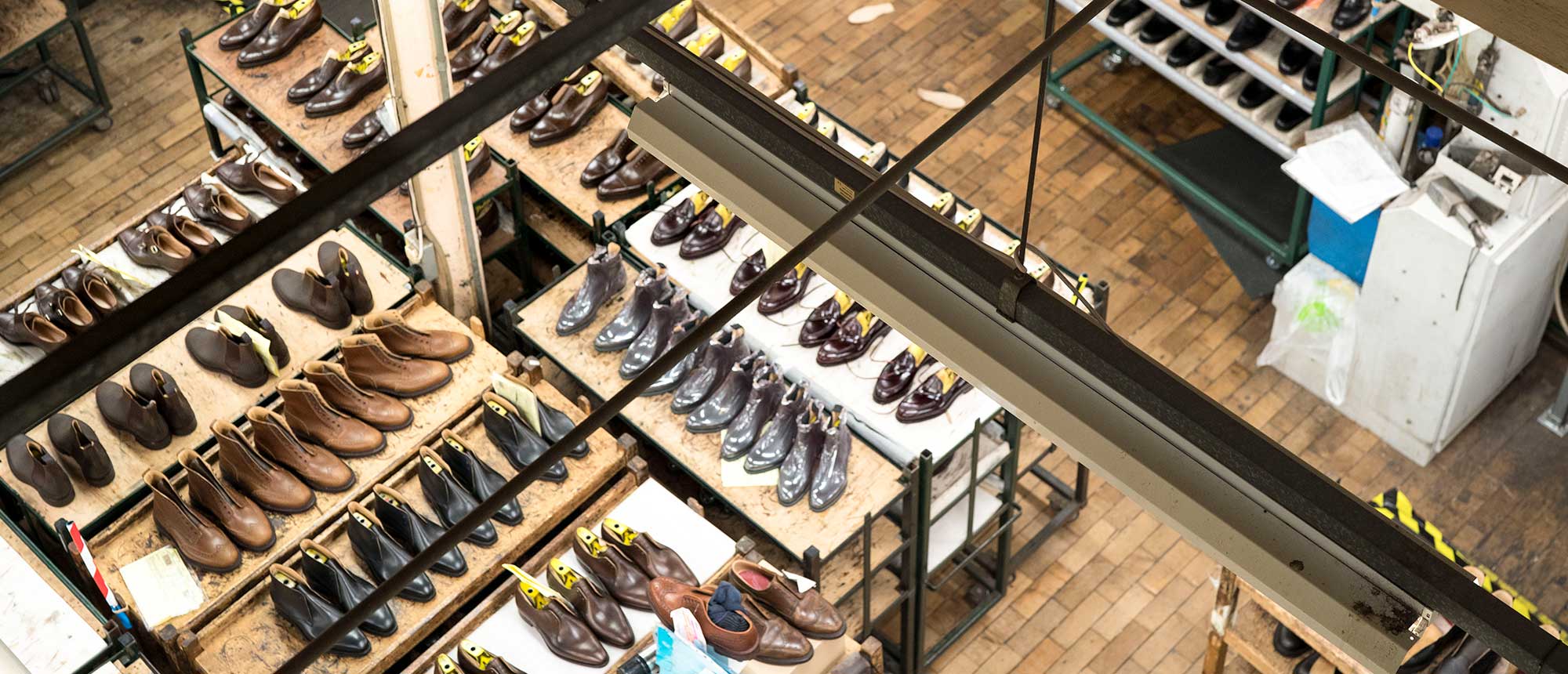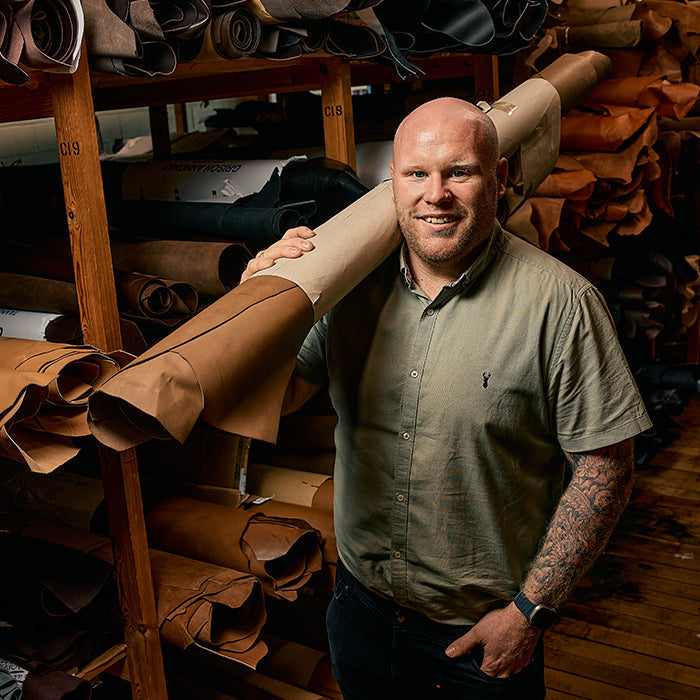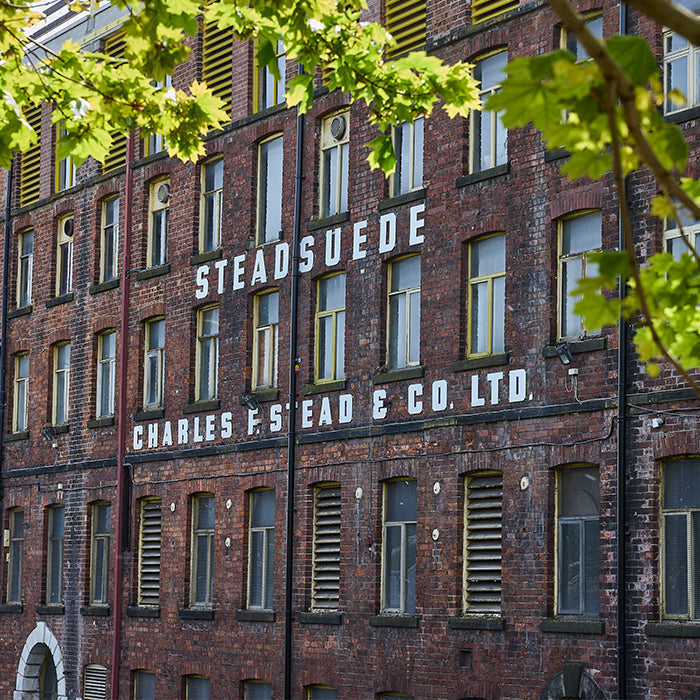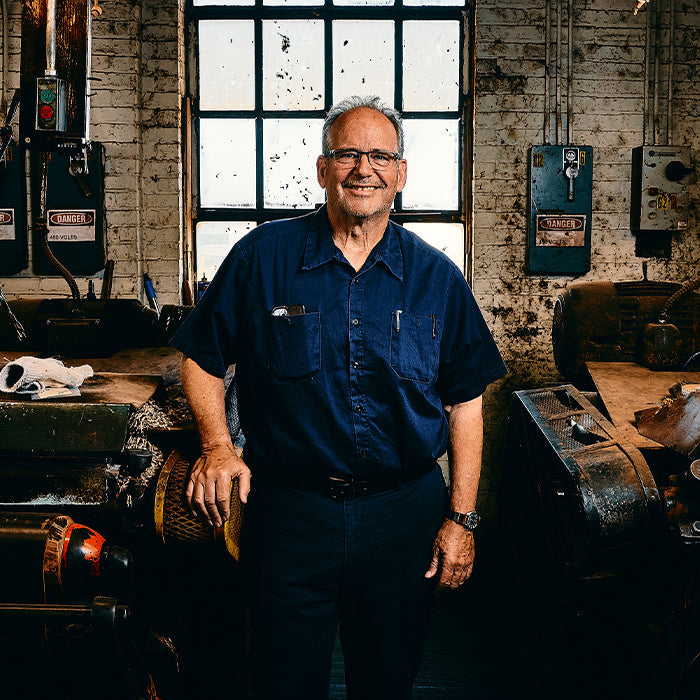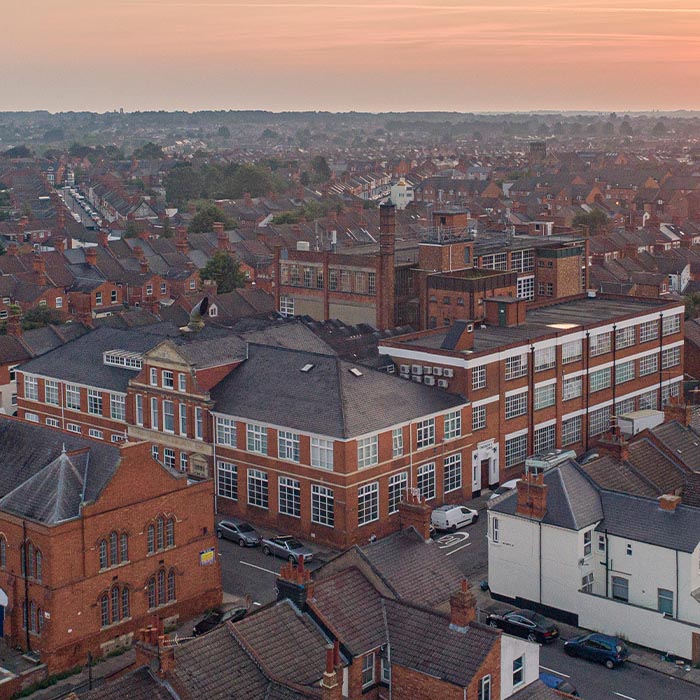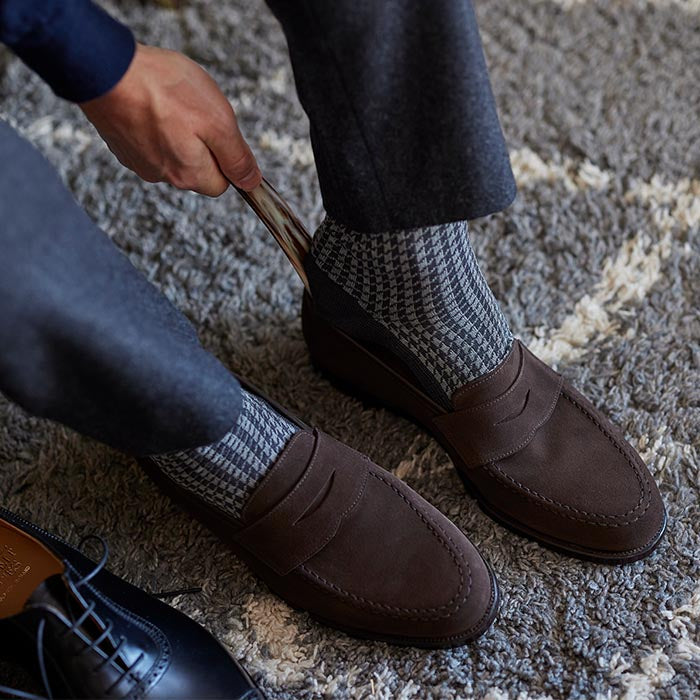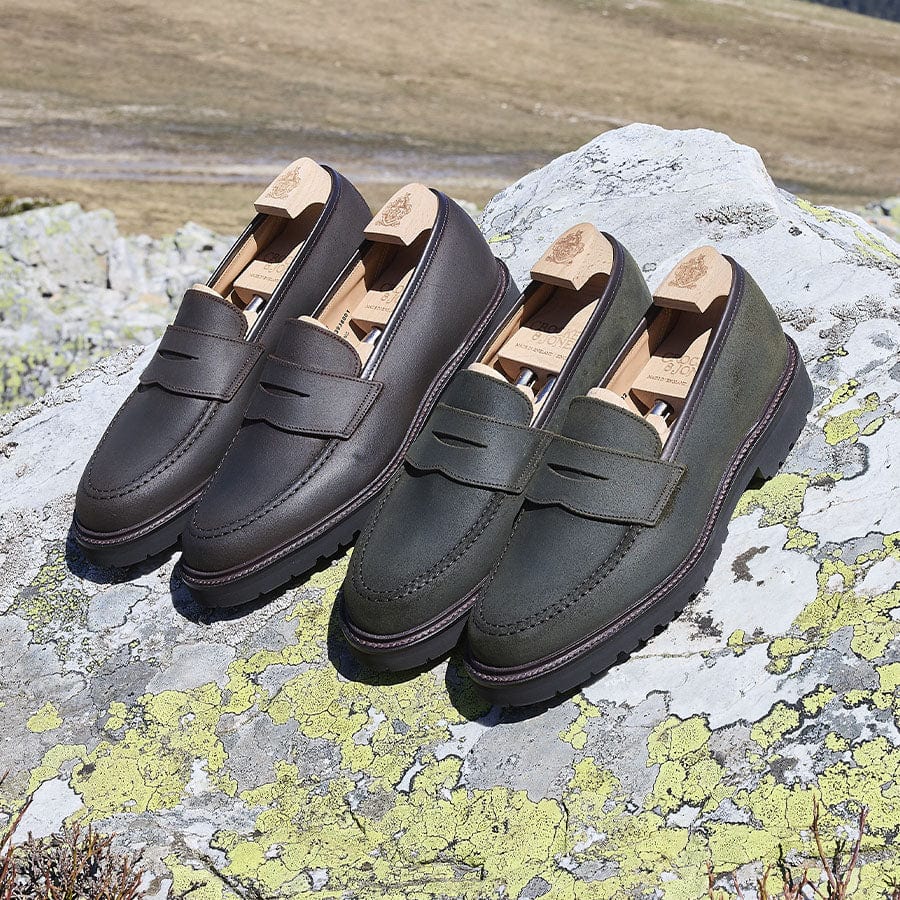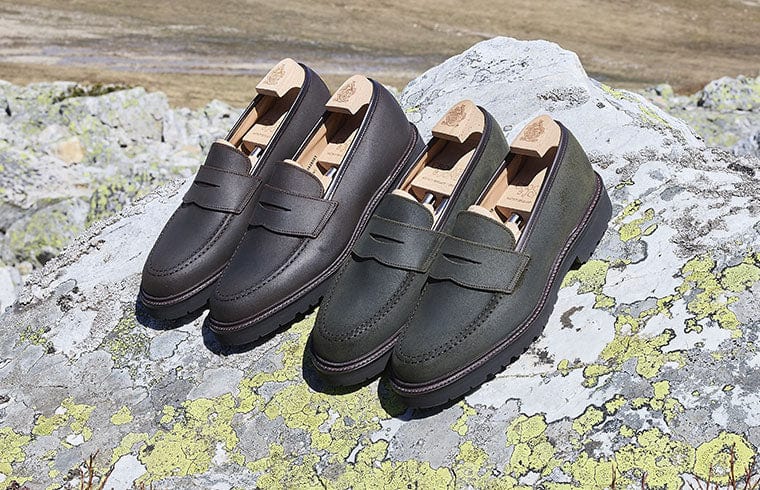MEN'S SHOES|grid|Men's|Collection|Using only the finest calf leathers from the leading tanneries of Europe, Crockett & Jones shoes are individually crafted on lasts designed to produce the best possible fitting characteristics. Each pair takes up to eight weeks to manufacture in a labour-intensive process involving over 200 highly skilled operations.|//us.crockettandjones.com/cdn/shop/files/menu-collection-AW25-mens-collection_600x.jpg?v=1757353135@The Summer Collection--mens|default|Summer Suede|COLLECTION|Thoughtful development sits at the heart of Crockett & Jones. Whilst the new collection offers something not seen from Crockett & Jones before with our new, Gum coloured rubber wedge sole, the entire collection remains made in England in our very own factory in Northampton|//us.crockettandjones.com/cdn/shop/files/menu-collection-ss25-summer-collection_600x.jpg?v=1741970455@SALE--mens|default|Winter|Sale|The Crockett & Jones Summer Sale is now available online and in-store with up to 30% off a selection of shoes & boots.|//us.crockettandjones.com/cdn/shop/files/menu-summer-winter-2024-mens_600x.jpg?v=1738512865@NEW SEASON--mens|default|New Season|Collection|Crockett & Jones’s more classic approach to design has paved the way for world recognised English style. With heritage and expertise coursing through the veins of our Northampton based craftsmen and women, our new collections are designed, developed and made to the highest possible standards in our Northampton shoe factory.|//us.crockettandjones.com/cdn/shop/files/menu-collection-AW25-mens-new-season-collection_600x.jpg?v=1757353134@Riviera Collection--mens|default|Riviera|COLLECTION|Inspired and named after the French Riviera. A European styled collection of soft, summer-weight Loafers, that benefit from more than just a fine eye for style.|//us.crockettandjones.com/cdn/shop/files/menu-collection-mens-riviera-collection-aw24-nice_600x.jpg?v=1738516507@25th Retail Anniversary Collection--mens|default|25th Years|ON JERMYN STREET|13th September 1997, the day on which we opened our first Crockett & Jones retail shop at 69 Jermyn Street, is a particularly memorable event in the annals of Crockett & Jones.|//us.crockettandjones.com/cdn/shop/files/menu-collection-mens-25-retail-collection_600x.jpg?v=1738549091@The Icons--mens|default|The Icons|...Timeless|Today, our products and their names have become icons, personalities even. They don’t just have relevance, they have become reference points of value and quality – recognisable from Crockett & Jones.|//us.crockettandjones.com/cdn/shop/files/menu-styles-mens-the-icons-2_600x.jpg?v=1738562086@Main Collection--mens|default|Main|Collection|The Main Collection of Crockett & Jones footwear encompasses a broad range of classic and contemporary styles for men. The assortment of leather and rubber soled shoes and boots are constructed with durable uppers from the finest European leathers including: aniline calf, suede and country grains. This collection presents a wide variety of choice for business, formal and casual wear.|//us.crockettandjones.com/cdn/shop/files/menu-collection-AW25-mens-main-collection_600x.jpg?v=1757353134@Hand Grade Collection--mens|default|Hand Grade|Collection|This unique collection of styles from Crockett & Jones represents the art of shoemaking at its highest level. Asymmetric lasts, shaped to the natural contours of the foot, gives exceptional fitting qualities. Uppers, cut from the finest calf skins with a supple tannage, provide glove-like comfort. They are hand finished to the highest level in a process which lasts up to 10 weeks.|//us.crockettandjones.com/cdn/shop/files/menu-handgrade-collection-09-03-2023_600x.jpg?v=1738544056@Shell Cordovan--mens|default|Shell Cordovan|Collection|The Shell Cordovan used by Crockett & Jones is both unique and exclusive. A traditional and lengthy process of specialist vegetable tanning, hand dyeing and finishing produces the distinctive strong fibre structure and rich shiny texture of Cordovan leather.|//us.crockettandjones.com/cdn/shop/files/menu-cordovan-collection-09-03-2023_600x.jpg?v=1738544012@Calf Collection--mens|default|Calf|Collection|Our Calf leather shoes are made from European calf skins from the finest tanneries. A strong tannage will ensure that this leather age well.|//us.crockettandjones.com/cdn/shop/files/menu-calf-collection-09-03-2023_600x.jpg?v=1738543951@Grain Collection--mens|default|Grain|Collection|Our embossed grain leathers are made from European calf skins with a special tannage, which keeps them supple but strong.|//us.crockettandjones.com/cdn/shop/files/menu-grain-collection-09-03-2023_600x.jpg?v=1738544021@Rough-Out Suede Collection--mens|default|Rough-Out Suede|COLLECTION|Our Rough-Out Suede is a tough suede with wax treatment on the surface, which gives it its rugged character and good water resistance.|//us.crockettandjones.com/cdn/shop/files/menu-ros-collection-09-03-2023_600x.jpg?v=1738543976@Suede Collection--mens|default|Suede|Collection|Our Main Collection suede leathers are strong, durable and offer excellent comfort.|//us.crockettandjones.com/cdn/shop/files/menu-collection-AW25-mens-suede-collection_600x.jpg?v=1757353135@Unlined Collection--mens|default|Unlined|Shoes & Boots|Our unlined construction process increases flexibility, breathability and comfort, without compromising quality. By utilising only the highest quality leathers with substance that will hold up to years of wear with ease. Unlined styles are perfect for the warmer summer months.|//us.crockettandjones.com/cdn/shop/files/menu-collection-ss25-unlined-collection_600x.jpg?v=1743090293@Ultimate Summer Loafers--mens|default|Ultimate|SUMMER LOAFERS|The most casual style of shoe within the Crockett & Jones collection is also one of our most popular. Thanks to the practical, easy-to-wear, season-spanning merits of the humble loafer...|//us.crockettandjones.com/cdn/shop/files/menu-collection-ss25-ultimate-loafer-collection_600x.jpg?v=1743090295@Winter Style Scottish Pursuits, pt1--mens|default|Winter Style|SCOTTISH PURSUITS PT1|This year, the outstanding landscape that forms the Scottish Trossachs provided the perfect playground for our new Autumn Winter collection.|//us.crockettandjones.com/cdn/shop/files/menu-scottish-pursuits-collection-aw24-islay-ros_600x.jpg?v=1738516438@Winter Style Scottish Pursuits, Pt2--mens|default|Winter Style|SCOTTISH PURSUITS PT2|Revisiting the stunning vistas overlooking the Firth of Clyde to the Isle of Arran, Crockett & Jones takes to the great outdoors for its new Autumn / Winter collection.|//us.crockettandjones.com/cdn/shop/files/menu-collection-new-season-aw24-cardigan-ros_600x.jpg?v=1738516448@Winter Style Icelandic Endeavour--mens|default|Winter Style|Icelandic Endeavour|For Autumn Winter 2022, Crockett & Jones embarked upon a journey north. Taking five new styles to the land of fire and ice, we put them through their paces across the breathtaking Icelandic terrain.|//us.crockettandjones.com/cdn/shop/files/menu-styles-mens-new-season-denver-dark-brown-aw24_600x.jpg?v=1738516481@Ultimate Winter Boots--mens|default|Ultimate|Winter Boots|Crockett & Jones prides itself on producing some of the finest shoes & boots in the world, but there is a side to C&J that is becoming more well-known...|//us.crockettandjones.com/cdn/shop/files/menu-styles-mens-ultimate-winter-boots-stock-aw24_600x.jpg?v=1738516521@The Black Editions--mens|default|The Black Editions|Collection|We present to you a concept never seen before from Crockett & Jones. An over-sized, ‘Cleated’ rubber sole is showcased using a selection of contemporary black leathers. ‘The Black Editions’ is an audacious collection of English footwear, influenced by Japanese style.|//us.crockettandjones.com/cdn/shop/files/menu-collection-mens-the-black-editions-collection-aw21-2_600x.jpg?v=1738562115@Unstructured Collection--mens|default|Unstructured|Unrivalled Comfort|Further refining our unlined construction process, we have created our first ever unstructured collection. Made in our own Northampton factory, the collection remains Goodyear welted using flexi-welts and lightweight ribbing.|//us.crockettandjones.com/cdn/shop/files/menu-collection-ss25-unstructured-collection_600x.jpg?v=1741970455@Winter Altitude, The Alps--mens|default|The Alps|WINTER ALTITUDE|Crockett & Jones introduces its most waterproof winter-ready boots by day, a collection of alpine-chic waterproof suedes by night, and a winter version of our illustrious Boston.|//us.crockettandjones.com/cdn/shop/files/menu-collection-AW25-mens-winter-altitude-collection_600x.jpg?v=1757353132@Ivy League Style--mens|default|Ivy League Style|AN ODE TO HERITAGE|Crockett & Jones is relaunching its own sporty, plain front, 5-eyelet Derby… Cornell, an Ivy League Blucher! These are typically broad in the toe, featuring top eyelets.|//us.crockettandjones.com/cdn/shop/files/menu-collection-mens-ivy-league-collection-aw24-penn_600x.jpg?v=1738516488@James Bond, No Time To Die--mens|default|No Time To Die|James Bond|Crockett & Jones proudly announces its official partnership with EON productions, the makers of the James Bond films. Crockett & Jones have previously worked with the 007 filmmakers on Skyfall, Spectre and the forthcoming film No Time To Die.|//us.crockettandjones.com/cdn/shop/files/menu-styles-mens-nttd-james-bond-aw24_600x.jpg?v=1738516532@James Bond, Goldfinger--mens|default|60th Anniversary|GOLDFINGER|Crockett & Jones and 007 film maker EON Productions announce an exclusive collaboration celebrating the 60th Anniversary of GOLDFINGER.|//us.crockettandjones.com/cdn/shop/files/menu-styles-mens-goldfinger-james-bond_600x.jpg?v=1738514475@Loafers--mens|default|Loafers|Penny, Tassel...|Loafers have grown from strength to strength over recent years and are the most casual style available from a Goodyear-welted shoemaker such as Crockett & Jones. Today, we have an extensive collection available in Calf, Suede and Grain in both ‘Lined’ and ‘Unlined’ forms.|//us.crockettandjones.com/cdn/shop/files/menu-styles-mens-loafers_600x.jpg?v=1738616395@All Boots--mens|default|Boots|Derby, Chelsea, Chukka...|The Crockett & Jones boot collection has grown considerably over recent years. Diverse in style and material there are few situations where a pair of Crockett & Jones Boots cannot be worn! This comprehensive collection covers a wide variety of boot styles.|//us.crockettandjones.com/cdn/shop/files/menu-styles-mens-boots_600x.jpg?v=1738617831@Derby Boots--mens|default|Derby Boots|Cap Toe, Brogue...|The most popular of all the boot styles, a Derby boot is a fully lined, high leg and all together, more substantial boot.|//us.crockettandjones.com/cdn/shop/files/menu-styles-mens-derby-boots-2_600x.jpg?v=1738562073@Chelsea Boots--mens|default|Chelsea Boots|Suede, Calf, Grain...|Expert pattern cutting, and shoemaking of the highest order, means Crockett & Jones makes some of the finest Chelsea boots on offer today.|//us.crockettandjones.com/cdn/shop/files/menu-styles-mens-chelsea-boots-2_600x.jpg?v=1738562106@Chukka Boots--mens|default|Chukka Boots|Two eyelet, Three eyelet|It is believed that a Chukka boot has both a sporting and a military heritage. A Chukka boot (or Desert boot) is constructed using three pieces of outer material|//us.crockettandjones.com/cdn/shop/files/menu-styles-mens-chukka-boots-2_600x.jpg?v=1738562104@Oxfords--mens|default|Oxfords|Toe Cap, Semi-Brogue...|The most easily recognisable of all classic styles, is the elegant English Oxford, synonymous among the English shoemakers. A formal style that dates back over two hundred years, it is thought to have been named by the students at Oxford University.|//us.crockettandjones.com/cdn/shop/files/menu-styles-mens-oxfords_600x.jpg?v=1738617141@Derbys--mens|default|Derbys|Brogue, Split Toe...|Derby shoes are possibly the most versatile of all shoe styles, bridging the gap between smart and smart casual wear with ease. Available in great variety, the Derby is also considered to be more comfortable to wear for longer periods of time.|//us.crockettandjones.com/cdn/shop/files/menu-styles-mens-derbys_600x.jpg?v=1738616056@Monk Straps--mens|default|Monk Straps|Single, Double...|Unbeknown to many, a Monk strap style hosts similar fitting qualities and construction to a Derby. You could think of a Monk style as a ‘modern day’ Derby, of sorts. With open quarters, and a whole cut vamp and tongue, Monk straps (single and double buckle) are remarkably comfortable on the foot.|//us.crockettandjones.com/cdn/shop/files/menu-styles-mens-monk-straps_600x.jpg?v=1738617031@Velvet Slippers--mens|default|Velvet Slippers|Plain Albert, Embroidered...|The development of the Albert Slipper coincided with the fashion of men wearing smoking jackets at the turn of the century. It is generally agreed that the style was named after Queen Victoria’s consort Prince Albert. Today however, times are very different but the velvet slipper remain as popular as ever.|//us.crockettandjones.com/cdn/shop/files/menu-styles-mens-slippers_600x.jpg?v=1738622774@Driving Shoes--mens|default|Driving Shoes|Elise, Exige...|These soft, unstructured and ultra-comfortable loafers / moccasins were made famous by the Italians in the 1960s. They are typically adorned during the warm summer months, and are often available in bright colours and soft suedes.|//us.crockettandjones.com/cdn/shop/files/menu-styles-mens-driving-shoes_cb68536a-098e-4c68-9fb7-d359cfb175af_600x.jpg?v=1738618263@WOMEN'S SHOES|grid|Women's|Collection|With a long-standing heritage of producing low heeled shoes for Women, dating back to 1920, the new Women's Collection has been developed in-house with quality, comfort and feminine elegance in mind. Encompassing Loafers, Oxfords, Derbys, Monk Strap and Boots.|//us.crockettandjones.com/cdn/shop/files/menu-collection-AW25-womens-new-season-collection_600x.jpg?v=1757353134@SALE--womens|default|Winter|Sale|The Crockett & Jones Summer Sale is now available online and in-store with up to 30% off a selection of shoes & boots.|//us.crockettandjones.com/cdn/shop/files/menu-summer-winter-2024-womens_600x.jpg?v=1738512856@Women's Collection--womens|default|Women's|Collection|With a long-standing heritage of producing low heeled shoes for Women, dating back to 1920, the new Women's Collection has been developed in-house with quality, comfort and feminine elegance in mind. Encompassing Loafers, Oxfords, Derbys, Monk Strap and Boots.|//us.crockettandjones.com/cdn/shop/files/menu-collection-AW25-womens-collection_600x.jpg?v=1757353131@The Icons--womens|default|The Icons|...Timeless|Today, our products and their names have become icons, personalities even. They don’t just have relevance, they have become reference points of value and quality – recognisable from Crockett & Jones.|//us.crockettandjones.com/cdn/shop/files/menu-styles-womens-boots_600x.jpg?v=1738617910@Calf Collection--womens|default|Calf|Collection|Our Calf leather shoes are made from European calf skins from the finest tanneries. A strong tannage will ensure that this leather age well.|//us.crockettandjones.com/cdn/shop/files/menu-collection-womens-calf-collection_600x.jpg?v=1738542558@Grain Collection--womens|default|Grain|Collection|Our embossed grain leathers are made from European calf skins with a special tannage, which keeps them supple but strong.|//us.crockettandjones.com/cdn/shop/files/menu-collection-womens-grain-collection_600x.jpg?v=1738542492@Suede Collection--womens|default|Suede|Collection|Our Main Collection suede leathers are strong, durable and offer excellent comfort.|//us.crockettandjones.com/cdn/shop/files/menu-collection-womens-suede-collection_600x.jpg?v=1738542505@New Season--womens|default|New Season|Collection|Crockett & Jones’s more classic approach to design has paved the way for world recognised English style. With heritage and expertise coursing through the veins of our Northampton based craftsmen and women, our new collections are designed, developed and made to the highest possible standards in our Northampton shoe factory.|//us.crockettandjones.com/cdn/shop/files/menu-collection-AW25-womens-new-season-collection_600x.jpg?v=1757353134@Boots--womens|default|Boots|Chelsea, Lace-up...|The Crockett & Jones boot collection has grown considerably over recent years. Diverse in style and material there are few situations where a pair of Crockett & Jones Boots cannot be worn! This comprehensive collection covers a wide variety of boot styles.|//us.crockettandjones.com/cdn/shop/files/menu-styles-womens-the-icons_600x.jpg?v=1738621122@Loafers--womens|default|Loafer|Tassel, Fringe...|Loafers have grown from strength to strength over recent years and are the most casual style available from a Goodyear-welted shoemaker such as Crockett & Jones. Today, we have an extensive collection available in Calf, Suede and Grian in both ‘Lined’ and ‘Unlined’ forms.|//us.crockettandjones.com/cdn/shop/files/menu-styles-womens-loafer_600x.jpg?v=1738619414@Oxfords--womens|default|Oxfords|Toe Cap, Semi-Brogue...|The most easily recognisable of all classic styles, is the elegant English Oxford, synonymous among the English shoemakers. A formal style that dates back over two hundred years, it is thought to have been named by the students at Oxford University.|//us.crockettandjones.com/cdn/shop/files/menu-styles-womens-oxford_600x.jpg?v=1738619155@Derbys--womens|default|Derbys|Town, Country...|Derby shoes are possibly the most versatile of all shoe styles, bridging the gap between smart and smart casual wear with ease. Available in great variety, the Derby is also considered to be more comfortable to wear for longer periods of time.|//us.crockettandjones.com/cdn/shop/files/menu-styles-womens-derby_600x.jpg?v=1738618066@Monk Straps--womens|default|Monk Straps|Single, Double...|Unbeknown to many, a Monk strap style hosts similar fitting qualities and construction to a Derby. You could think of a Monk style as a ‘modern day’ Derby, of sorts. With open quarters, and a whole cut vamp and tongue, Monk straps (single and double buckle) are remarkably comfortable on the foot.|//us.crockettandjones.com/cdn/shop/files/menu-styles-womens-monk_600x.jpg?v=1738620175@Velvet Slippers--womens|default|Velvet Slippers|Plain Albert, Embroidered...|The development of the Albert Slipper coincided with the fashion of men wearing smoking jackets at the turn of the century. It is generally agreed that the style was named after Queen Victoria’s consort Prince Albert. Today however, times are very different but the velvet slipper remain as popular as ever.|//us.crockettandjones.com/cdn/shop/files/menu-styles-womens-slippers_600x.jpg?v=1738618841@Evening Wear Collection--mens|default|Evening Shoes|A Patented Evening|With a long-standing history of producing Patent shoes that dates back as long as Patent leather itself, we know a thing or two about quality.|//us.crockettandjones.com/cdn/shop/files/menu-collection-mens-a-patented-evening-aw24_600x.jpg?v=1738516328@Unlined Styles--womens|default|Unlined|Shoes & Boots|Our unlined construction process increases flexibility, breathability and comfort, without compromising quality. By utilising only the highest quality leathers with substance that will hold up to years of wear with ease. Unlined styles are perfect for the warmer summer months.|//us.crockettandjones.com/cdn/shop/files/menu-styles-womens-unlined_600x.jpg?v=1738564027@ACCESSORIES|grid|Belts & Accessories|Collection|The Accessories Collection consists of essential shoe care products that if used regularly, will ensure your Crockett & Jones shoes age well over time. The Belt Collection is made from skins chosen from the very best tanneries in Europe which are specially dyed to exactly complement our footwear.|//us.crockettandjones.com/cdn/shop/files/menu-belts-all-2_600x.jpg?v=1738624557@Calf--belts|default|Calf|Belt|The Crockett & Jones Belt Collection is made from skins chosen from the very best tanneries in Europe which are specially dyed to exactly complement our footwear. Each belt is fully lined, expertly stitched and has a hand-finished buckle of the highest quality.|//us.crockettandjones.com/cdn/shop/files/menu-belts-all-2_600x.jpg?v=1738624557@Suede--belts|default|Suede|Belts|The Crockett & Jones Belt Collection is made from skins chosen from the very best tanneries in Europe which are specially dyed to exactly complement our footwear. Each belt is fully lined, expertly stitched and has a hand-finished buckle of the highest quality.|//us.crockettandjones.com/cdn/shop/files/menu-belts-all-2_600x.jpg?v=1738624557@Grain--belts|default|Grain|Belts|The Crockett & Jones Belt Collection is made from skins chosen from the very best tanneries in Europe which are specially dyed to exactly complement our footwear. Each belt is fully lined, expertly stitched and has a hand-finished buckle of the highest quality.|//us.crockettandjones.com/cdn/shop/files/menu-belts-all-2_600x.jpg?v=1738624557@Shell Cordovan--belts|default|Shell Cordovan|Belts|The Crockett & Jones Belt Collection is made from skins chosen from the very best tanneries in Europe which are specially dyed to exactly complement our footwear. Each belt is fully lined, expertly stitched and has a hand-finished buckle of the highest quality.|//us.crockettandjones.com/cdn/shop/files/menu-belts-all-2_600x.jpg?v=1738624557@Woven Calf--belts|default|Woven Calf|Belt|The Crockett & Jones Belt Collection is made from skins chosen from the very best tanneries in Europe which are specially dyed to exactly complement our footwear. Each belt is fully lined, expertly stitched and has a hand-finished buckle of the highest quality.|//us.crockettandjones.com/cdn/shop/files/menu-belts-all-2_600x.jpg?v=1738624557@Rough-Out Suede--belts|default|Rough-Out Suede|Belt|The Crockett & Jones Belt Collection is made from skins chosen from the very best tanneries in Europe which are specially dyed to exactly complement our footwear. Each belt is fully lined, expertly stitched and has a hand-finished buckle of the highest quality.|//us.crockettandjones.com/cdn/shop/files/menu-belts-all-2_2e7ab457-a0d9-4a86-92f9-c453f9aec276_600x.jpg?v=1738624372@Socks-acc|default|Socks|COLLECTION|Our new socks collection, from the London Sock Company, combines contemporary classics with a splash of colour. The new additions are comfortable, durable and stylish.|//us.crockettandjones.com/cdn/shop/files/menu-accessories-socks_600x.jpg?v=1738543405@Saphir Medaille d'Or--acc|default|Saphir|Medaille d'Or|Crockett & Jones only uses the highest quality components combined with the most skilled craftsmanship - a successful recipe for producing beautiful handmade shoes that represent excellent value for your investment. Proper care and maintenance of your shoes will help to ensure their longevity in wear.|//us.crockettandjones.com/cdn/shop/files/menu-accessories-medaille-dor_065f75a0-dba8-4e96-85b3-47eae99d0fd4_600x.jpg?v=1738683937@Shoe Care Kits--acc|default|Shoe Care Kits|Perfect For Travel|Crockett & Jones shoe care kits come with a variety of shoe care products in a, zip up, leather holdall. Proper care and maintenance of your shoes will help to ensure their longevity in wear.|//us.crockettandjones.com/cdn/shop/files/menu-accessories-shoe-kit_600x.jpg?v=1738683771@Shoe Trees--acc|default|Shoe Trees|Aid Drying & Reduce Creasing|Shoe Trees are an extremely important part of caring for your Crockett & Jones shoes. Shoe trees have excellent moisture absorbency, gradually dry your shoes from the inside and reduce creasing of the vamp.|//us.crockettandjones.com/cdn/shop/files/menu-accessories-shoe-tree_13d09d98-55f7-4f5b-99c9-e713cf39e156_600x.jpg?v=1738684584@Shoe Brushes--acc|default|Shoe Brushes|Polishing & Buffing|To properly care for your Crockett & Jones shoes, you should use two or three different brushes. Shoe brushes should be used to remove dust and light dirt from your shoes, whilst you keep others separate for the removal of excess polish after application.|//us.crockettandjones.com/cdn/shop/files/menu-accessories-shoe-brush_600x.jpg?v=1738683335@Polishing Mitt--acc|default|Polishing Mitt|The Final Buff|A glove like design, made using our high quality dark brown calf suede and genuine lamb’s wool, produces the perfect accessory to give your calf and grain shoes its ‘perfect’ final buff.|//us.crockettandjones.com/cdn/shop/files/menu-accessories-polishing-mitt_600x.jpg?v=1738556314@Shoe Horns--acc|default|Shoe Horns|Essential|Shoe Horns are equally as important as Shoe Trees & Polish when caring for your Crockett & Jones shoes. A Shoe Horn provides a smooth surface to easily slip your foot into your shoes and thus reducing damage to the heel of your shoes, particularly loafers.|//us.crockettandjones.com/cdn/shop/files/menu-accessories-shoe-horn_600x.jpg?v=1738624242@Shoe Bags--acc|default|Shoe & Boot Bags|Protection|Shoe Bags should be used to store your shoes to protect them from dust, scratches and light, especially whilst travelling.|//us.crockettandjones.com/cdn/shop/files/menu-accessories-shoe-bag_600x.jpg?v=1738556305@Laces--acc|default|Shoe & Boot Laces|Replacements|Over time, laces can become frayed and unsightly. Polish aside, a new pair of laces is a great way to give your shoes & boots a new lease of life.|//us.crockettandjones.com/cdn/shop/files/menu-accessories-laces_600x.jpg?v=1738549037@STORES|gallery|Stores & Stockists||Crockett & Jones’s finest English shoes & boots are stocked by many luxury stores worldwide, including our own flagship retail stores in London, Birmingham, Paris, New York and Brussels.|//us.crockettandjones.com/cdn/shopifycloud/storefront/assets/no-image-2048-a2addb12_600x.gif@Our Stores|default|Our Stores||Crockett & Jones flagship retail stores can be found in London, Birmingham, Paris, New York and Brussels. Each store houses a comprehensive collection of Goodyear welted shoes & boots.|//us.crockettandjones.com/cdn/shop/files/menu-cta-our-stores-03-06-24-v2_600x.jpg?v=1738521393@Special Order Service|default|Special Order Service||Crockett & Jones flagship retail shops offer a Special Order service for the customer who wishes to have a pair of shoes or boots made to their own unique specifications.|//us.crockettandjones.com/cdn/shop/files/menu-cta-special-order-03-06-24-v2_600x.jpg?v=1738521421@Stockist Locator|default|Stockist Locator||Crockett & Jones’s finest English shoes & boots are stocked by many luxury stores worldwide, including our own flagship retail stores in London, Birmingham, Paris, New York and Brussels.|//us.crockettandjones.com/cdn/shop/files/menu-cta-stockists-03-06-24-v2_600x.jpg?v=1738521410@SHOE CARE|gallery|Shoe Care||Proper shoe care and maintenance of your Crockett & Jones shoes will help to ensure their longevity in wear. If you follow the guidelines below, there is no reason why your shoes will not last for many years.|//us.crockettandjones.com/cdn/shopifycloud/storefront/assets/no-image-2048-a2addb12_600x.gif@Calf|default|Calf||Full grain European calf leather, produces some of the finest shoes in the world. Smart in appearance, smooth calf can be found throughout our collections, and if cared for well will age beautifully.|//us.crockettandjones.com/cdn/shop/files/menu-cta-shoe-care-calf_fd0f4058-3a5b-4028-850c-122e21c6c50d_600x.jpg?v=1738685661@Suede|default|Suede||High quality suede is far more robust that most might appreciate. Do not be fooled by its velour like finish. Suede is very easy to care for, if you know how…|//us.crockettandjones.com/cdn/shop/files/menu-cta-shoe-care-suede_600x.jpg?v=1738685649@Grain|default|Grain||The grain used by Crockett & Jones is embossed, full grain European calf. Of a slightly heavier substance than our smooth calf, grain can better withstand the elements throughout the colder seasons.|//us.crockettandjones.com/cdn/shop/files/menu-cta-shoe-care-grain_600x.jpg?v=1738684588@Cordovan|default|Cordovan||Cordovan is extremely hard wearing and will get better with age. It has a depth of colour that is difficult to achieve with any other material, but requires a little more care and attention than other leathers.|//us.crockettandjones.com/cdn/shop/files/menu-cta-shoe-care-cordovan_600x.jpg?v=1738685663@Rough-Out Suede|default|Rough-Out Suede||Our most casual of materials, those who own Rough-Out Suede C&J’s get quite attached to it, but how do you give it the correct care and attention…?|//us.crockettandjones.com/cdn/shop/files/menu-cta-shoe-care-ros_600x.jpg?v=1738685888@GUIDES|gallery|The Guides||Crockett & Jones and its products is a vast, but fascinating subject. To understand what lasts, styles, soles and materials go into our product collection, we have created a number of informative guides.|//us.crockettandjones.com/cdn/shopifycloud/storefront/assets/no-image-2048-a2addb12_600x.gif@Last Guide|default|Last Guide||Crockett & Jones is well known for its diverse selection of lasts. Once understood, our broad variation lasts can bring much enjoyment to your fitting and purchasing decisions.|//us.crockettandjones.com/cdn/shop/files/menu-cta-guide-last_5b20697a-1a8f-44a3-8bd9-c85dfdfd9184_600x.jpg?v=1738683776@Style Guide|default|Style Guide||As they say, knowledge is power… Our Style guide gives you a little insight into the different types of English shoes that are available from Crockett & Jones.|//us.crockettandjones.com/cdn/shop/files/menu-cta-guide-style_02f426aa-c7bc-4fca-9a9a-4c657ccd7c0c_600x.jpg?v=1738685260@Sole Guide|default|Sole Guide||This guide brings together our wide variety of soles on offer, in one place. With the growth of the rubber sole, today, our collection of fine footwear covers an almost unending array of scenarios.|//us.crockettandjones.com/cdn/shop/files/menu-cta-guide-sole_a5a50166-fa77-4df7-bfa1-3d205250fe58_600x.jpg?v=1738685260@Material Guide|default|Material Guide||‘Leather’ is a vast topic, one that Crockett & Jones takes very seriously indeed. In our opinions, you can only produce high quality shoes by utilising and fully understanding high quality materials.|//us.crockettandjones.com/cdn/shop/files/menu-cta-guide-material_16df619c-f48e-4266-bd01-5e376bb5e8bb_600x.jpg?v=1738684547@Fitting Guide|default|Fitting Guide||There is never a substitute for trying a pair of shoes on in person. Our ‘fitting at distance’ guide is exactly that, a guide and it will help us to answer your fitting enquiries to the best of our abilities.|//us.crockettandjones.com/cdn/shop/files/menu-cta-guide-fitting_78106101-e853-4f0b-b680-f9f35e6c45eb_600x.jpg?v=1738685260@MAKING & REPAIR|gallery|Making & Repair||Founded in 1879 in Northampton, at the heart of England's most famous shoemaking town, Crockett & Jones specialise in the manufacture of high quality Goodyear welted footwear.|//us.crockettandjones.com/cdn/shopifycloud/storefront/assets/no-image-2048-a2addb12_600x.gif@In the Making|default|In the Making||Crockett & Jones has been manufacturing shoes in Northampton, England since 1879 and much of the factory today, looks just as it did when it was first built.|//us.crockettandjones.com/cdn/shop/files/menu-cta-our-itm-03-06-24-v2_600x.jpg?v=1738521452@Repairs|default|Repairs||One of the benefits of owning a pair of Goodyear welted shoes is that you can have them re-soled without damaging the uppers, thereby prolonging their lifespan.|//us.crockettandjones.com/cdn/shop/files/menu-cta-our-repairs-03-06-24-v2_600x.jpg?v=1738521433@Our Heritage|default|Our Heritage||Founded in 1879 in Northampton, at the heart of England's most famous shoemaking town, Crockett & Jones specialise in the manufacture of high quality Goodyear welted footwear.|//us.crockettandjones.com/cdn/shop/files/menu-cta-heritage_600x.jpg?v=1738683335@THE ARTICLE|gallery|The Article||Delve into the authentic world of Crockett & Jones. Inspired by the people, the heritage and the products of Crockett & Jones.|//us.crockettandjones.com/cdn/shopifycloud/storefront/assets/no-image-2048-a2addb12_600x.gif@The Article--sub|default|The Article||Delve into the authentic world of Crockett & Jones. Inspired by the people, the heritage and the products of Crockett & Jones.|//us.crockettandjones.com/cdn/shop/files/menu-cta-the-article_19ec9441-405d-43d6-89b4-da8b66cb0948_600x.jpg?v=1738623661@Guest Authors|default|Guest Authors||Well-respected menswear and womenswear journalism and an uprising of customer-turned online sensations will bring a host of Articles for you to enjoy at your own pace.|//us.crockettandjones.com/cdn/shop/files/menu-cta-guest-author-2025_600x.jpg?v=1759829931@In the Media|default|In the Media||A snap shot of Crockett & Jones’s media features. View press cuttings from our trusted media partners and friends. Advertising & editorial from throughout the year.|//us.crockettandjones.com/cdn/shop/files/menu-cta-in-the-media_3b61627e-54b9-40ab-8211-6786e22dac3d_600x.jpg?v=1738620162@#madetobeworn|default|Social Media||Tag your wonderful photos with 'crockettandjones_official' or tag your images with #madetobeworn to be feature on our social wall…|//us.crockettandjones.com/cdn/shop/files/menu-cta-made-to-be-worn_8095f31f-c782-48ef-944c-86f383d8110f_600x.jpg?v=1738625020@Leather Goods|default|Leather Goods|BILLFOLD, CARD CASE, CARD HOLDER|For the first time in its 145-year history, Crockett & Jones offers a curated selection of complementary leather goods|//us.crockettandjones.com/cdn/shop/files/menu-collection-leather-goods-willow_600x.jpg?v=1738513305@Billfold Wallets--acc|default|Billfold Wallets|CALF, WILLOW GRAIN, ROUGH-OUT, CORDOVAN|The billfold is the largest of our wallets. It features space for six to eight cards, two slip pockets, and a full-width opening for notes.|//us.crockettandjones.com/cdn/shop/files/menu-collection-leather-goods-billfold-wallet_600x.jpg?v=1738513310@Folded Card Case--acc|default|Folded Card Cases|CALF, ROUGH-OUT, CORDOVAN|The folded card case is our mid-sized wallet. It features space for three to six cards and an expanding, gusseted pocket for folded notes.|//us.crockettandjones.com/cdn/shop/files/menu-collection-leather-goods-folded-card-case_600x.jpg?v=1738513329@Card Holder--acc|default|Card Holders|CALF, CORDOVAN, CROCODILE|The card holder is our smallest wallet. It features space for four to eight cards with a central pocket for folded notes.|//us.crockettandjones.com/cdn/shop/files/menu-collection-leather-goods-card-holder_600x.jpg?v=1738513268@
